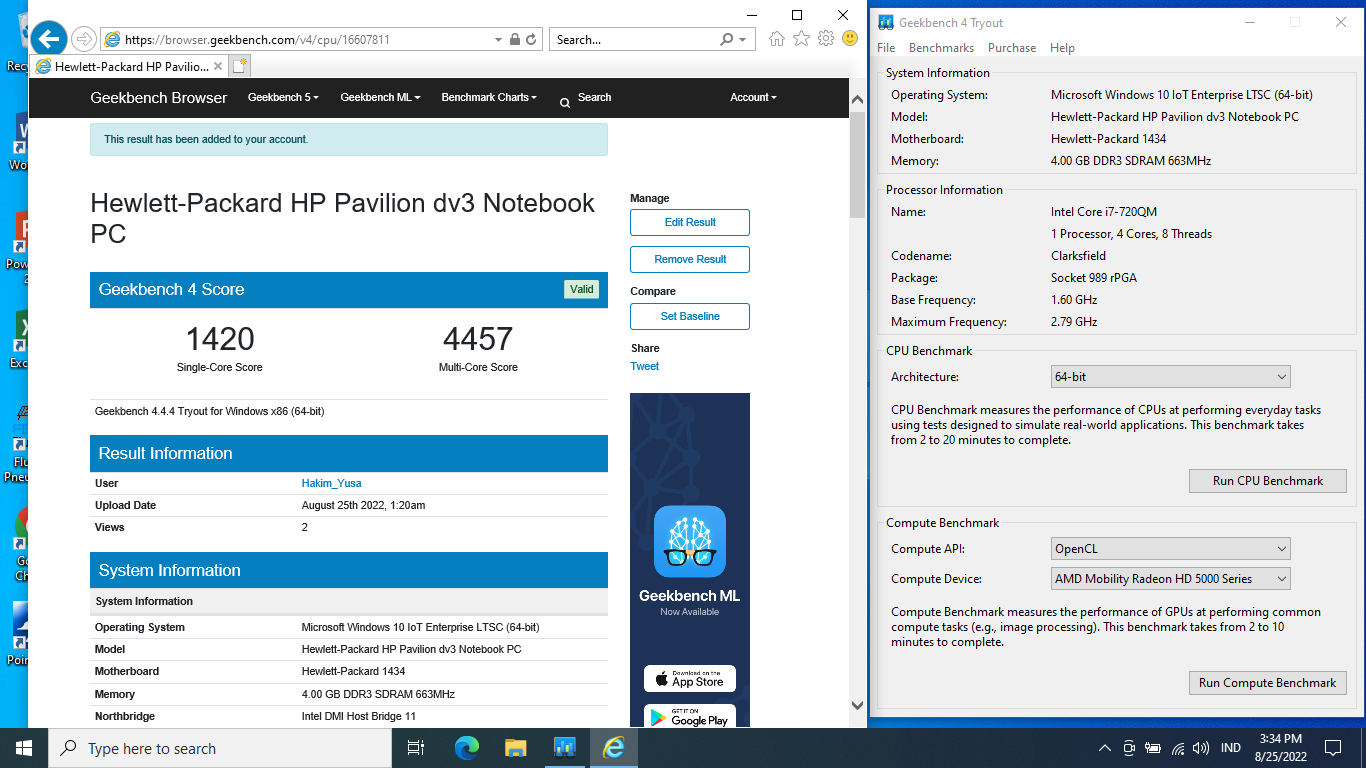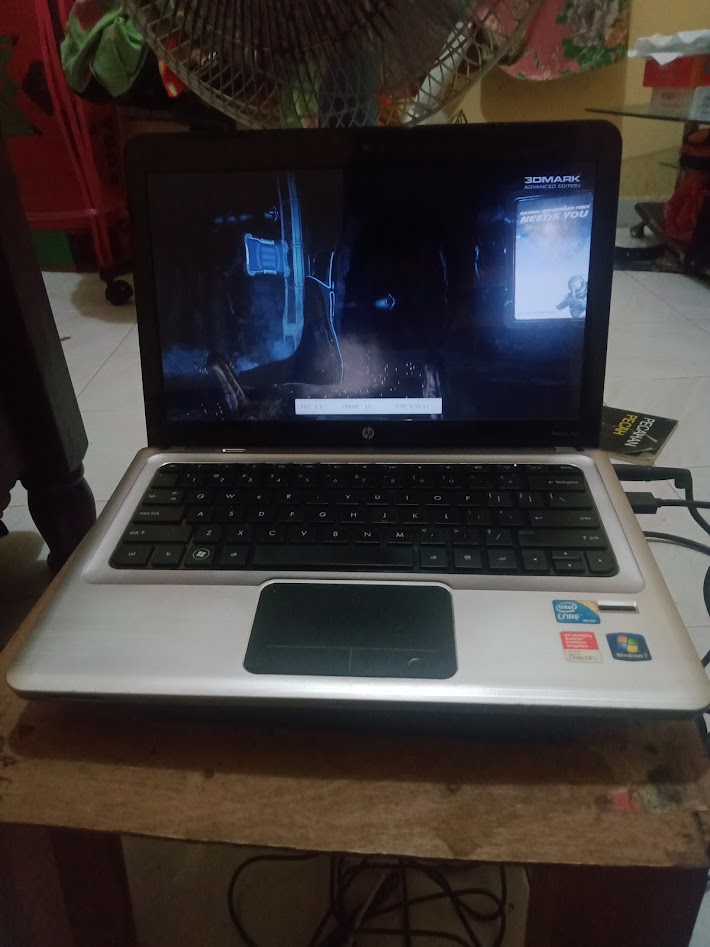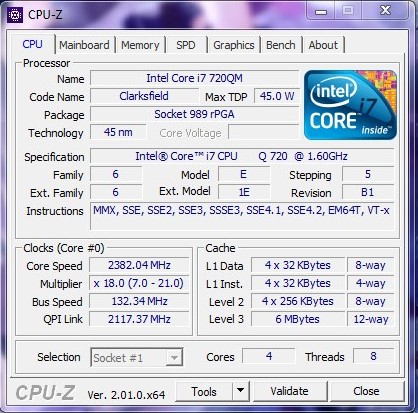Geekbench4 - Multi Core score 4457 points with a i7-720QM
Thursday, 01 January 1970 07:00 | Update at null
Media Gallery
Screenshot

Device, Setup, etc



URL
https://hwbot.org/submission/5068118https://bit.ly/3cXdQD1
Information Detail
Hardware: Intel Core i7 720QM
Specs:CPUID : Intel(R) Core(TM) i7 CPU Q 720 @ 1.60GHz
Architecture : x86
Codename : Clarksfield
L3 Cache : 6MB
Clock : 1.60GHz - 2.80GHz
Core/Thread : 4/8
TDP : 45W
Technology : 45nm
Socket : PGA988
IGPU : -
See more specification...
Software: Geekbench4 - Multi Core
Score: 4457 points
About: Geekbench4 - Multi CoreGeekbench 4 – Multi Core is a cross-platform benchmarking tool designed to measure processor performance in multi-threaded scenarios. Developed by Primate Labs, Geekbench 4 has become one of the most popular benchmarks due to its ability to test system performance under various types of modern computational workloads. The Multi Core mode is specifically designed to assess the efficiency and processing power of the CPU when all cores and threads are used simultaneously.
In this test, Geekbench 4 runs various real-world simulation scenarios, including data encryption, image processing, file compression, physics simulation, and machine learning. All of these tasks are designed to be executed in parallel, utilizing all available cores and threads on the processor. The resulting scores reflect how well the CPU handles heavy and complex workloads, such as rendering, video editing, or professional multitasking.
Geekbench 4 Multi Core is highly relevant in the era of processors with multiple cores and threads. High scores indicate that the CPU can efficiently divide and manage tasks, which is a critical factor in high-performance work environments. This benchmark is also useful for comparing performance across various types of devices, from high-end desktops and laptops to servers and mobile devices with multi-core capabilities.
The main advantage of Geekbench 4 is its consistent and accurate approach, as well as its ability to run on various operating systems such as Windows, macOS, Linux, Android, and iOS. This allows users to make fair and objective performance comparisons between different devices and processor architectures.
Overall, Geekbench 4 Multi Core is an essential tool for users who want to evaluate the computational power of their processors in multitasking workloads and scenarios requiring intensive parallel processing.
The Intel Core i7-720QM, launched in Q3 2009, was one of the first mobile quad-core processors to feature Intel's Nehalem microarchitecture, specifically the Clarksfield variant. Targeted at high-performance laptops, such as gaming machines and mobile workstations, the i7-720QM brought 4 physical cores and 8 threads to the mobile platform, thanks to Hyper-Threading Technology providing a significant boost in multi-threaded workloads like video editing, 3D rendering, and other professional-grade applications. The processor runs at a base clock speed of 1.6 GHz, but it can dynamically increase up to 2.8 GHz using Intel Turbo Boost, depending on thermal headroom and power availability.
Manufactured using a 45nm process, the i7-720QM has a TDP of 45W, which is quite high by today's mobile CPU standards. This thermal demand necessitated more robust cooling solutions in laptops that featured the chip. Unlike modern CPUs, the i7-720QM does not come with integrated graphics, which means systems based on this processor require a dedicated GPU often from AMD or NVIDIA for graphics processing and display output. As such, it was typically paired with mid-to-high-end discrete graphics cards in its time, making it a solid choice for gaming and multimedia laptops in the late 2000s and early 2010s.
While the Core i7-720QM was a powerhouse during its release, its performance and efficiency are significantly outpaced by modern CPUs built on smaller nodes and with higher IPC (Instructions Per Clock). Nevertheless, legacy laptops using the i7-720QM can still be viable for basic computing tasks like web browsing, document editing, or watching videos especially if paired with an SSD upgrade and increased RAM. Users running Windows 10 on such systems may experience some limitations, but with proper optimization and lightweight software, the CPU can still deliver a usable experience in non-demanding environments.
Hardware Detail:
Device: HP Pavilion dv3-4054TX
RAM: 4GB DDR3 Single Channel
OS: Windows 7, Windows 10
* Not Avaiable
